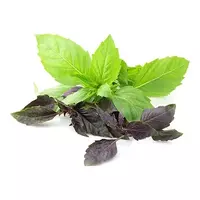Basil

The homeland of the basilica is called India. In addition to the usual name for us, this odorous weed bears several more, including rhean, reagan, and sweet cornflower. According to history, he came to Europe with the soldiers of Alexander the Great. Currently, basil is cultivated as an agricultural crop in the CIS countries, USA, China and India.
Basil is considered truly one of the most versatile herbs with an unsurpassed aroma, as it can be used either alone or in mixtures with other spices and herbs. It perfectly complements the composition of various sauces and simply decorates the dishes. However, due to the fact that the aromatic properties of basil during heat treatment quickly evaporate, it is recommended to add it to ready-made dishes or, in extreme cases, to hot ones a couple of minutes before readiness. The calorie content of basil is small and is equal to 23 kcal per 100 grams of greens.
When fresh, basil serves as a seasoning for salads, meat and fish dishes, as well as poultry dishes. For pickling, not only the fresh greens of this grass are used, but also the spice in dried form. It's just impossible to imagine Mediterranean cuisine without this wonderful fragrant weed of green or dark purple.
Basil benefits
It tones perfectly, contributing to the general strengthening of the body, so the benefits of the basilica are obvious during the recovery period after the operations. It can be applied both externally and internally. For rinsing the throat for respiratory infections, a special infusion is prepared, which includes this healing plant. If you are worried about bad breath, gum inflammation or tooth decay, this medicine will also come to the rescue.
With a slight diuretic effect, this natural medicine can soften small kidney stones, as well as remove excess uric acid. At the initial stage of the development of urolithiasis is just a wonderful natural medicine. By the way, regular use of basil in general has a beneficial effect on the normal operation of the entire genitourinary system.
Also, the benefits of basil are justified in the treatment of headache, cardiac pain of a neurotic nature, cough, rheumatism and a number of other diseases. Traditional medicine recommends the use of basil as a preventive anticancer agent.
The harms of the basilica
Basil, despite many useful properties, has contraindications. The harm of basil is manifested in inflammation of the mucous membranes when it is consumed excessively. This green should be treated with extreme caution in the presence of cardiovascular diseases and diabetes mellitus.
23 kCal basilica
Energy value of basil (Ratio of proteins, fats, carbohydrates - ju):
Proteins: 3.15 g (~ 13 kCal)
Fats: 0.64 g (~ 6 kCal)
Carbohydrates: 1.05 g (~ 4 kCal)
Energy ratio (bj | y): 55% | 25% | 18%
 Español
Español Français
Français Português
Português Русский
Русский 简体中文
简体中文 繁體中文
繁體中文 日本語
日本語 한국어
한국어 العربية
العربية Türkçe
Türkçe Қазақ
Қазақ Deutsch
Deutsch Italiano
Italiano Українська
Українська
